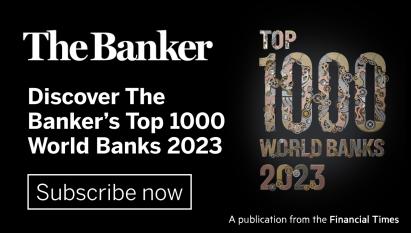Banco Bradesco, Brazil’s largest non-government bank in asset terms, is enjoying impressive income growth. But it cannot afford to rest on its laurels if it wants to keep up with the competition.Bill Hieronymous in Săo Paulo explains why.
Márcio Cypriano, president and CEO of Banco Bradesco SA, appears confident yet relaxed as he talks to The Banker at the bank’s headquarters in Osasco, Săo Paulo. His contentment may be due to the bank’s announcement a few days earlier that its third-quarter net income has soared to R$752m ($263m) from R$564m a year ago – growth of 33%.
Yet Bradesco has some way to go to catch up with its rival Banco Itaú, a fact that Mr Cypriano appears to shrug off. “This [larger market capitalisation for Itaú] is a function of its higher profitability in the last four years, higher than that of Bradesco,’’ he says. “This doesn’t bother us because we aren’t going to sell Bradesco.’’
World
Latest articles from World
Bradesco lags behind in value and efficiency
December 1, 2004A model economy for South America?
December 1, 2004
Chile may outshine its regional rivals with an economy that has matured since its democratisation in 1990, but there is still work to be done to raise the living standards of the general population, as Jason Mitchell reports.
Chile, the most successful economy in South America, needs major structural reform if it is to enjoy the kind of economic growth seen in the countries of east Asia.
The winning ways of a profit generator
December 1, 2004
Morgan Stanley’s China business is highly profitable, says co-head of China investment Jonathan Zhu. He tells Karina Robinson, in Beijing, about the bank’s winning strategies.
China may be slowing down as the authorities cut back on credit availability but foreign investment banks’ business is being boosted: as the government puts the brakes on credit, domestic companies are turning abroad for their funds and Morgan Stanley is one of the beneficiaries.
The US-headquartered investment bank ranks number two in Chinese equity capital markets in the year-to-date with a deal value of $2589m, giving it a 19% market share, according to data provider Dealogic.
How Hong Kong made its own luck
December 1, 2004
Hong Kong’s Financial Secretary Henry Tang tells Karina Robinson the reasons he believes are behind the resurgence of China’s Special Administrative Region.
Q To what do you ascribe Hong Kong’s economic recovery? You have upgraded your forecasts to 7.5% GDP growth in 2004.
A A combination of factors. They say timing is everything and I agree. In the first quarter of 2003, when I was Secretary of Commerce, Industry and Technology, the figures were already showing signs of recovery. Unfortunately, the light at the end of the tunnel was the headlight of an oncoming train. It was a situation where a budding recovery was ruined by one quarter of [the respiratory disease] SARS. [But in addition] the Free Trade Agreement was signed with the People’s Republic of China. [People saw that the mainland government] was prepared to put money where their mouth is. It is not just one country two systems, they also support us and help us improve our situation [for example through allowing] individual travel [for China mainlanders]. Also, Hong Kong people are particularly adaptable and resilient. I have lived in Hong Kong for the better part of my life and have seen Hong Kong come through many crises.
Bulgaria pulls up a seat at the EU table
December 1, 2004
With plans to sign an accession agreement next year, Bulgaria is preparing itself to become a EU member. Nick Kochan reports from The Banker’s conference.
Bulgaria has moved centre stage among the nations of central Europe. In due course, this will translate into a seat at the EU members’ table, perhaps as early as 2007. These considerations are driving Bulgarian economic and structural policy today.
That was clear at The Banker business conference, Banking on Bulgaria, held recently in London and sponsored by investment fund Equest. Solomon Passy, Bulgaria’s foreign affairs minister, told the conference that his government had two priorities when it came to power three years ago: the first was membership of NATO, which was achieved shortly after the election; the second was to prepare the country for EU membership.
Brazil’s central bank takes over at Santos
December 1, 2004Brazil’s central bank assumed control of the operations of struggling Banco Santos on November 15 after the latter was ordered to provide R$700m ($251m) to cover defaulted loans, a sum that exceeded its ability to pay by R$100m.
Turkey expects glitches in currency changeover
December 1, 2004
Turkey is likely to experience problems when it introduces a new currency next year, bankers and economists fear.
Turkey is due to introduce the currency, the new Turkish lira (YTL), on January 1. Six zeros will be knocked off the old currency in a move to ease accounting practices, reduce strains on payment systems and create psychological conditions to curb inflation forever.
Greek bonds maintain their appeal despite S&P credit downgrade
December 1, 2004The decision by Standard & Poor’s to downgrade Greece’s credit rating has damaged the country’s image but will have little impact on the cost of borrowing, according to Athens-based analysts.
Italy’s retail sector gets a much-needed shake-up
November 4, 2004
Massimo Arrighetti, head of retail at Italy’s Banca Intesa, talks to Stephen Timewell about the earthquake in his bank’s retail sector that has led not only to a radical rethink, but also to a step change in processes.
When Banco Ambrosiano Veneto, Cariplo and Banca Commerciale Italiana joined forces in late 2002 to form the largest bank in Italy, Banca Intesa, they also formed a bank with a staggering 1,500 different retail products.
Islamic insurance sector gets a boost in Bahrain
November 4, 2004Against the background of its solid reputation as an international banking centre, Bahrain is expanding the scope of its activities with the development of its insurance market.



